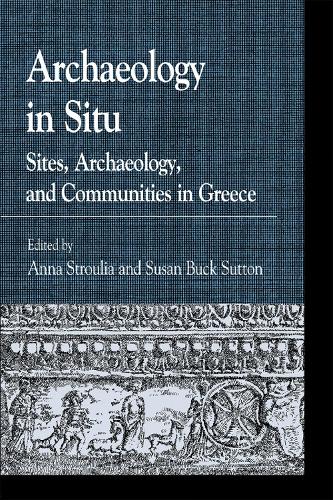
Archaeology in Situ: Sites, Archaeology, and Communities in Greece
(Paperback)
Publishing Details
Archaeology in Situ: Sites, Archaeology, and Communities in Greece
By (Author) Anna Stroulia
Edited by Susan Buck Sutton
Contributions by Amy Papalexandrou
Contributions by Leslie G. Kaplan
Contributions by Eleana Yalouri
Contributions by Roxani Caftanzoglou
Contributions by Charles Stewart III
Contributions by Pelagia Astrinidou
Contributions by Olga Demetriou
Contributions by Eleftheria Deltsou
Bloomsbury Publishing PLC
Lexington Books
9th March 2010
United States
Classifications
Tertiary Education
Non Fiction
938
Physical Properties
Paperback
532
Width 155mm, Height 233mm, Spine 34mm
826g
Description
This volume explores the ways local communities perceive, experience, and interact with archaeological sites in Greece, as well as with the archaeologists and government officials who construct and study such places. In so doing, it reveals another side to sites that have been revered as both birthplace of Western civilization and basis of the modern Greek nation. The conceptual terrain of those who live near such sites is complex and furrowed with ambivalence, confusion, and resentment. For many local residents, these sites are gated enclaves, unexplained and off limits, except when workers are needed.
While cleavages between residents and archaeologists have received attention elsewhere, they have been little examined in Greece, where they are often masked by sweeping statements on the glory of antiquity that overlook the extent to which ordinary Greeks have become disconnected from these places in their midst. The complexity of this situation, freighted as it is with two centuries of archaeological practice, is explored in this volume from multiple viewpoints and with respect to sites from prehistoric to Ottoman and beyond. Several chapters trace the origins of the disconnection between archaeological sites and communities, relating it to the ways in which early travelers appropriated sites for their own purposes, the subsequent move of archaeology onto the slippery slope created by the travelers, and the concurrent depiction of Greek peasants as passive and uninformed. Other chapters chronicle the active ways in which communities have contested the development and representation of particular sites and even sometimes created alternative landscapes with other points of entry to the valued Greek past. Still others recount and assess recent archaeological efforts to reconnect residents to the sites in their midst. Archaeology in Situ will be of particular value to those interested in modern Greek studies, Greek archaeology, Classics, public archaeology, archaeological ethics, anthropology, cultur
Reviews
Archaeology in Situ is a brilliant series of case studies, highly focused and beautifully written. This volume is at the forefront of the most important series of changes in our disciplines for decades, an indispensable tool for the understanding of the shifting relationship between anthropology and archaeology and how we can work together. I recommend it for researchers and students alikeindeed to all those who are interested in archaeology and anthropology in the field, in what really is going on at the trowel's edge. -- David Shankland, University of Bristol
Stroulia and Sutton ask, 'How can we expect local residents to care about sites if they have no stake in them' Supported by well-documented contributions from some two dozen colleagues, Greek and non-Greek, they propose a thoughtful and innovative scheme for reaching 'some form of collaborative ownership or management, even of official sites' in Greece. The result is an important case study that must be of interest to all archaeologists. Bridging the chasm that exists between archaeological sites and the people who live near them is crucial. How else can we hope to create sustainable heritage management plans but by working to build a bridge between the past and present -- Jack L. Davis, The American School of Classical Studies at Athens
This 500-page volume, written and edited in accord with high standards, contains 19 chapters written by a group of experienced Greek and US scholars. It provides abundant examples of how the physical evidence provided by archaeological investigations continues to alter perceptions of the Greek past....Summing Up: Recommended. * Choice Reviews *
Author Bio
Anna Stroulia teaches for the Department of Sociology, Anthropology, and Criminal Justice at the University of Southern Indiana. She is the author of Flexible Stones: Ground Stone Tools from Franchthi Cave.
Susan Buck Sutton is associate vice president of international affairs and professor of anthropology at Indiana University. She is editor of Contingent Countryside: Settlement, Economy and Land Use in the Southern Argolid Since 1700.
